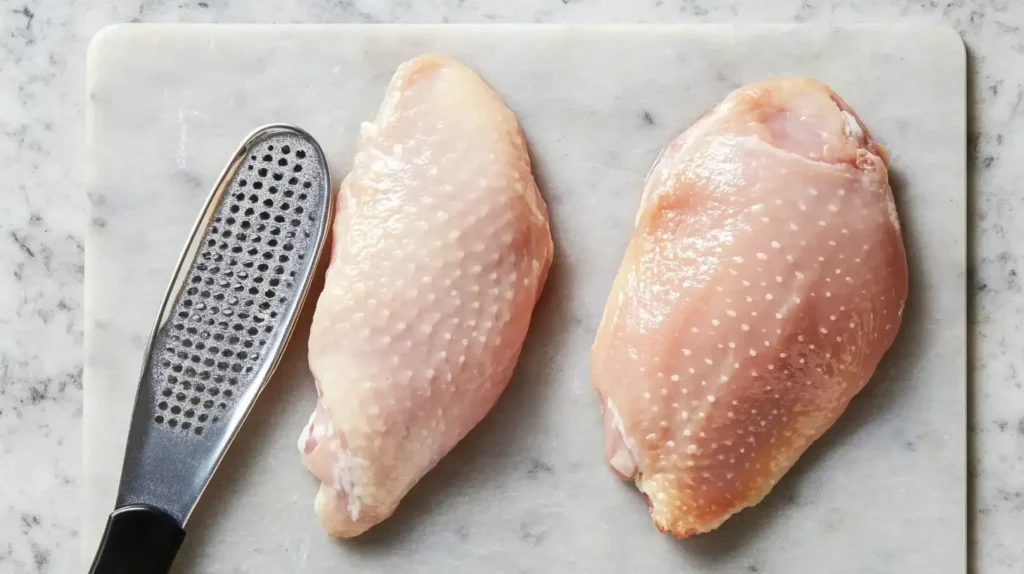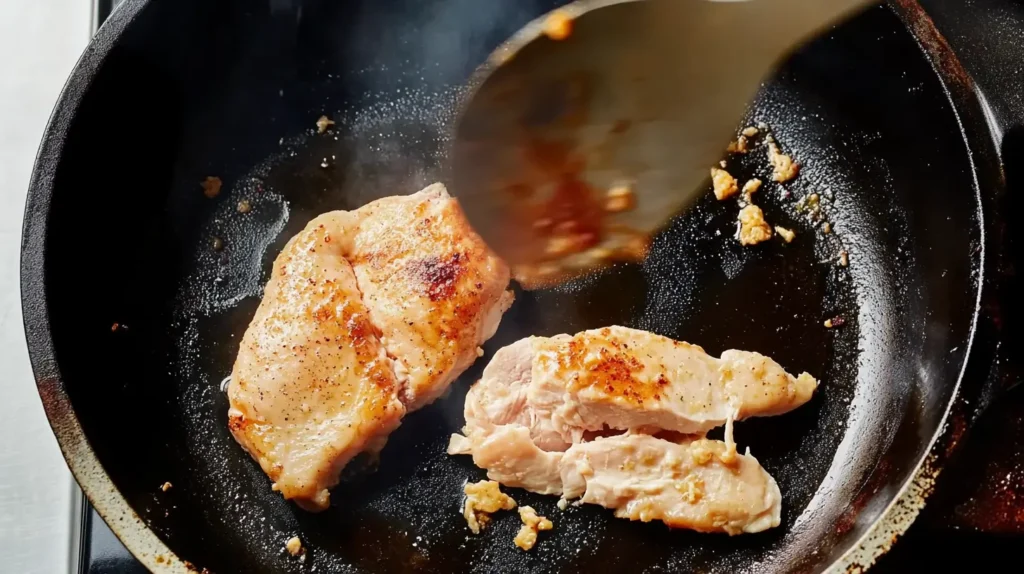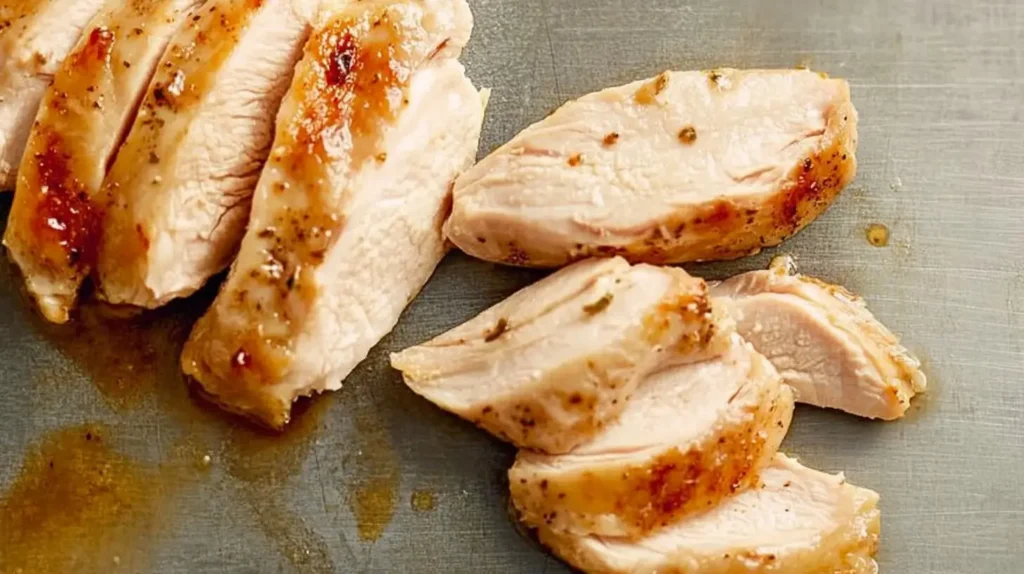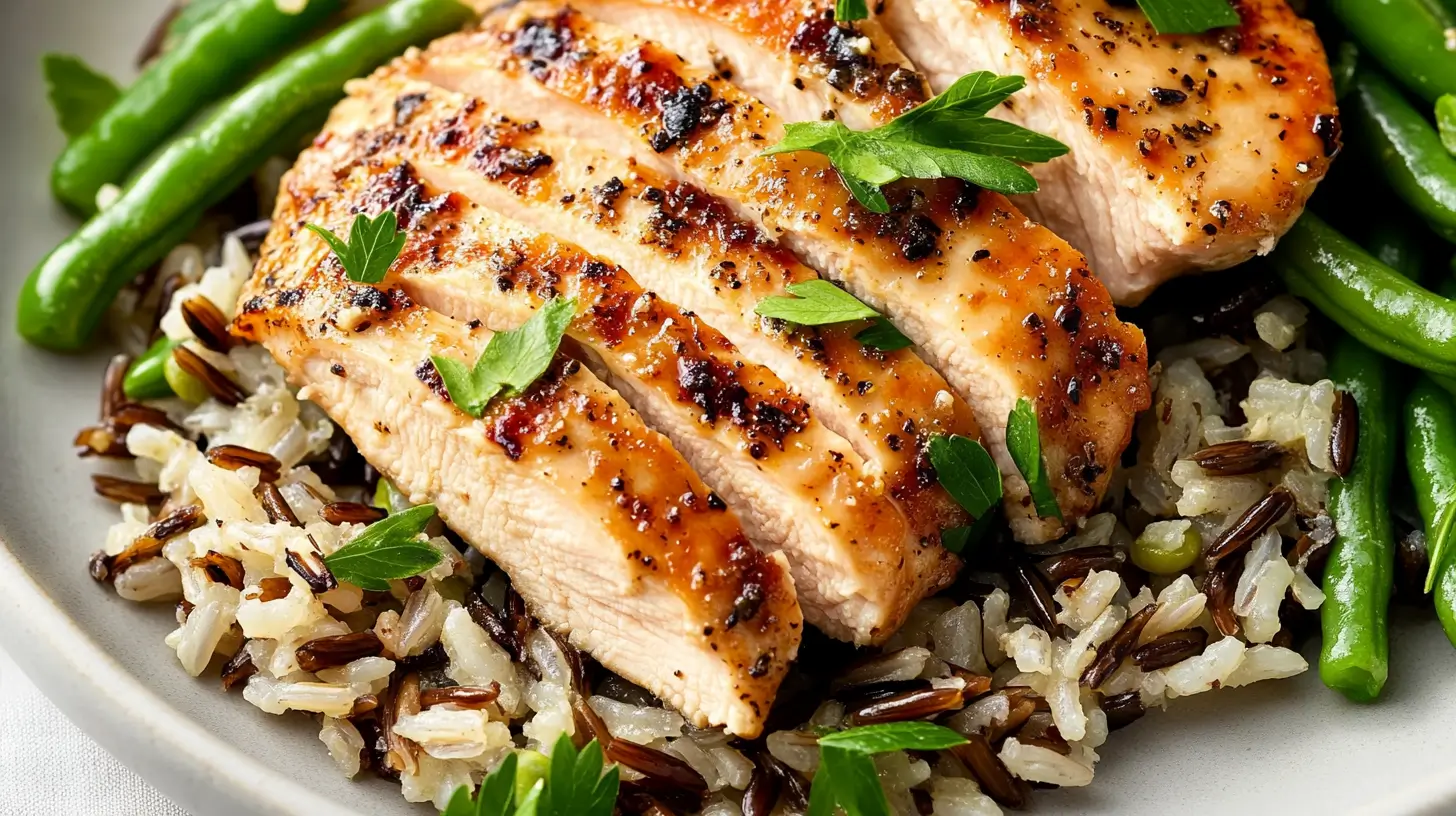Chicken is a staple in most kitchens, but there’s nothing worse than ending up with dry, tough, or rubbery meat. If you’ve ever asked yourself, “How to cook chicken tender and juicy?”—you’re not alone!
In this ultimate guide, we’ll dive into everything you need to know about making chicken tender and flavorful. From cooking methods like baking, pan-frying, and slow-cooking to brining, marinating, and resting techniques, we’ve got you covered. Plus, we’ll share tips on cooking times, best temperatures, and recipes that ensure your chicken turns out perfectly moist every time.
Let’s start with the basics—what makes chicken tender in the first place?
Table of Contents
1: Understanding What Makes Chicken Tender
Why Tenderness Matters in Chicken Cooking
Nobody wants to bite into a dry, chewy piece of chicken. Tender chicken isn’t just about taste—it’s about texture, juiciness, and an overall enjoyable eating experience. Cooking chicken properly means preserving its natural moisture and breaking down the tough muscle fibers so that every bite is soft and succulent.
But what really affects tenderness? Let’s break it down.
Factors That Affect Chicken Tenderness
1. Cut of Chicken: Breast, Thighs, or Tenderloins?
Not all cuts of chicken cook the same way!
- Chicken breasts are lean but can dry out quickly if overcooked.
- Chicken thighs have more fat and stay juicy longer.
- Chicken tenderloins (the small strip beneath the breast) are naturally more tender and cook faster.
Knowing your cut helps determine the best cooking method and temperature to keep the meat moist.
2. Cooking Methods & Temperatures
Heat control is everything! Cooking chicken at too high a temperature can cause the proteins to seize up, leading to dry, tough meat.
- Low-and-slow methods (like poaching, slow-cooking, or sous vide) keep chicken tender by gently cooking it over time.
- Quick and hot methods (like searing or grilling) can work if you don’t overcook it.
The key? Cooking chicken to the right internal temperature—165°F (75°C) for most cuts.
3. Marinades and Brining: Unlocking Ultimate Tenderness
Ever wonder why restaurant chicken is so juicy? The secret lies in marinades and brining.
- Brining (soaking in a saltwater solution) helps the meat retain moisture and enhances flavor.
- Marinades (using acidic or enzyme-based ingredients like yogurt, buttermilk, lemon juice, or pineapple) break down proteins, making the chicken softer and more flavorful.

Using a meat tenderizer to pound chicken breast evenly helps it cook tender and juicy.
2: The Best Ways to Cook Tender Chicken
Cooking chicken can be tricky—you want it juicy, flavorful, and tender, but it’s easy to overcook and end up with something dry and tough. The good news? There are several tried-and-true cooking methods that help lock in moisture while keeping your chicken incredibly soft.
Let’s explore the best ways to cook chicken tender, ensuring that every bite is delicious and satisfying.
Moist Heat vs. Dry Heat Cooking Methods
The way you cook your chicken greatly affects its tenderness. There are two main approaches:
- Moist heat cooking uses water, broth, or steam to gently cook the chicken. It helps break down tough fibers and keep the meat moist.
- Dry heat cooking uses direct heat (like baking or grilling) and often requires extra steps, like marinating or basting, to prevent dryness.
Both methods can work if done correctly, but moist heat techniques often result in the most tender chicken.

Sprinkling salt and pepper on raw chicken breasts to enhance flavor and juiciness before cooking.
Slow Cooking for Ultimate Tenderness
One of the easiest ways to cook chicken so that it falls apart is by using a slow cooker.
- Set your slow cooker to low heat (200–250°F) and cook for 4–6 hours.
- Use broth or a marinade to infuse the meat with flavor.
- Chicken thighs and tenderloins work best for this method.
This method is perfect for pulled chicken or juicy shredded chicken for tacos, salads, or sandwiches.
Poaching Chicken for a Soft and Moist Texture
Poaching might sound fancy, but it’s one of the simplest ways to cook chicken tender.
- Bring a pot of water or broth to a low simmer—don’t boil!
- Add your chicken and let it gently cook for 10–15 minutes.
- Check for an internal temperature of 165°F before removing.
Since poaching doesn’t use oil, it’s also a healthier option while keeping the chicken incredibly soft and juicy.
Sous Vide Cooking for Perfectly Tender Chicken
Sous vide is the gold standard for keeping chicken ultra-tender. It involves sealing the meat in a vacuum bag and cooking it in a water bath at a precise temperature.
- Set your sous vide cooker to 145°F and cook chicken breasts for 1–2 hours.
- The controlled temperature prevents overcooking, ensuring the chicken stays juicy.
- Sear the outside for extra flavor after cooking.
While it takes longer than traditional methods, sous vide chicken is virtually foolproof—it’s impossible to dry it out!
Pan-Frying and Searing for Juicy Chicken with a Crisp Finish
If you prefer a crispy outside but juicy inside, pan-frying is your best bet.
- Heat a bit of oil or butter in a pan over medium heat.
- Cook the chicken for 3–5 minutes per side, flipping only once.
- Finish cooking in the oven at 350°F for 5–10 minutes if using thicker cuts.
For extra tenderness, use a meat thermometer and remove the chicken when it hits 160°F—carryover cooking will bring it to 165°F.
Baking Chicken Without Drying It Out
Baking is convenient, but it’s also one of the easiest ways to overcook chicken. To keep it tender:
- Marinate the chicken first or coat it with butter or olive oil.
- Bake at a lower temperature—325–350°F—for a longer time.
- Cover with foil for part of the cooking process to trap moisture.
For bone-in chicken, baking at a slightly higher temperature (375–400°F) helps keep the skin crispy while the inside stays juicy.
Grilling Chicken Without Losing Moisture
Grilling gives chicken a smoky, charred flavor, but it can dry out fast. To keep it tender:
- Brine or marinate the chicken before grilling.
- Use indirect heat—cook over medium, not high, heat.
- Flip only once to avoid losing juices.
- Remove at 160°F, let it rest, and it will reach 165°F.
Want even more chicken cooking tips? Check out this guide on the easiest and healthiest ways to cook chicken.

Searing a seasoned chicken breast in a cast-iron skillet to lock in moisture and enhance flavor.
3: How to Keep Chicken Tender and Juicy
Now that we’ve covered the best cooking methods, let’s dive into proven tricks to make sure your chicken stays moist, juicy, and tender—every single time.
Brining: Saltwater Magic for Soft Chicken
Ever wondered why restaurant chicken is always juicier? The secret is brining!
- A basic brine is 1/4 cup salt per 4 cups of water.
- Let the chicken soak for 30 minutes to 4 hours before cooking.
- You can add sugar, herbs, or spices for extra flavor.
Brining helps chicken retain moisture, making it softer and more flavorful.
Marinating Techniques for Maximum Tenderness
Marinating does more than add flavor—it breaks down proteins to keep chicken tender. The best marinades include:
1. Acidic Marinades (Break Down Fibers for Softness)
- Yogurt or buttermilk (great for fried chicken)
- Lemon juice or vinegar
- Wine or citrus-based sauces
These work best when marinated for at least 1–2 hours.
2. Enzyme-Based Marinades (Naturally Tenderize Meat)
- Pineapple juice (contains bromelain)
- Papaya or kiwi puree (contains natural tenderizers)
- Soy sauce (breaks down proteins gently)
Just be careful—marinate too long, and the chicken can become mushy!
Using a Meat Thermometer to Prevent Overcooking
One of the biggest mistakes home cooks make is guessing when the chicken is done. A meat thermometer takes out the guesswork:
- Breasts and tenderloins: Cook to 165°F.
- Thighs and drumsticks: Cook to 175°F (they need extra time for tenderness).
- Whole chicken: Check in the thickest part of the thigh, away from bone.
Using a thermometer guarantees perfect tenderness every time.
Letting Chicken Rest Before Cutting
After cooking, don’t cut into your chicken immediately!
- Let it rest for 5–10 minutes before slicing.
- This allows the juices to redistribute, keeping the meat moist.
- If you cut too soon, all the juices will run out, making it dry.
Bonus Tip: Pound Chicken for Even Cooking
If you’re working with chicken breasts, pounding them to an even thickness before cooking helps them cook evenly.
- Use a meat mallet or rolling pin to gently flatten thick parts.
- This ensures no overcooked edges and no undercooked center.
By using brining, marinating, temperature control, and resting, you’ll never have to deal with dry, chewy chicken again!
Want more delicious chicken recipes? Check out these easy chicken recipes for dinner.
4: How Long to Cook Chicken for Tender Results
Cooking time plays a huge role in making chicken tender. Undercook it, and you risk foodborne illness. Overcook it, and you’re left with dry, tough meat. So, how long should you cook chicken to get it just right?
Let’s break it down based on different cuts and cooking methods so you’ll never overcook your chicken again.
Cooking Time for Different Chicken Cuts
Each cut of chicken has a different ideal cooking time, depending on size and cooking method.
1. Chicken Breasts
Chicken breasts are lean and cook quickly. The key to keeping them tender is not overcooking them.
- Baking: 20–25 minutes at 375°F (190°C)
- Pan-frying: 6–8 minutes per side over medium heat
- Grilling: 6–7 minutes per side over medium-high heat
- Poaching: 10–15 minutes in simmering water
- Sous vide: 1.5–2 hours at 145°F (63°C)
2. Chicken Thighs
Since thighs have more fat, they can handle longer cooking times without drying out.
- Baking (bone-in): 35–40 minutes at 375°F
- Pan-frying (boneless): 6–8 minutes per side
- Grilling: 8–10 minutes per side
- Slow cooking: 4–6 hours on low heat
3. Chicken Tenderloins
Tenderloins are small, so they cook very fast.
- Baking: 12–15 minutes at 375°F
- Pan-frying: 3–4 minutes per side
- Grilling: 4–5 minutes per side
4. Whole Chicken
Cooking a whole chicken takes time, but low and slow is the secret to tenderness.
- Roasting: 1 hour 30 minutes at 375°F
- Slow cooking: 6–8 hours on low heat
Best Internal Temperatures for Tender Chicken
To guarantee tenderness without overcooking, use a meat thermometer and follow these temperatures:
- Chicken breasts & tenderloins: 165°F (75°C)
- Chicken thighs & drumsticks: 175–185°F (79–85°C)
- Whole chicken: 165°F in the thickest part
Signs That Chicken Is Perfectly Cooked
If you don’t have a thermometer, use these visual cues:
- Juices run clear, not pink when cut.
- The meat pulls apart easily (for thighs or slow-cooked chicken).
- The internal color is white but still moist.
Now that you know exactly how long to cook each cut, let’s move on to some delicious recipes that guarantee tender chicken every time!
5: Tender Chicken Recipes and Cooking Techniques
Now that you’ve mastered how to cook chicken tender, it’s time to put your skills to the test with these delicious, foolproof recipes.
Garlic Butter Chicken Tenders Recipe
Nothing beats juicy chicken tenders cooked in garlic butter! This recipe is quick, easy, and packed with flavor.
Ingredients:
- 1 lb chicken tenderloins
- 2 tbsp butter
- 3 cloves garlic, minced
- 1 tsp paprika
- ½ tsp salt
- ½ tsp black pepper
- 1 tbsp olive oil
Instructions:
- Heat olive oil in a pan over medium-high heat.
- Season chicken with salt, pepper, and paprika.
- Cook for 3–4 minutes per side until golden brown.
- Reduce heat to low, add butter and garlic, and cook for another minute.
- Serve hot and enjoy!
Baked Chicken Tenders Without Breading
Looking for a healthier option? Baking without breading keeps the chicken tender while cutting out extra carbs.
Instructions:
- Preheat oven to 375°F.
- Season chicken with garlic powder, onion powder, paprika, salt, and pepper.
- Place on a lined baking sheet and bake for 12–15 minutes.
- Let rest before serving.
For more tips on healthy chicken recipes, check out this guide on easy and healthy ways to cook chicken.
Pan-Fried Chicken Tenders for Extra Juiciness
Pan-frying creates a crispy outside while locking in moisture.
Instructions:
- Heat a mix of butter and olive oil in a pan.
- Cook chicken over medium heat for 3–5 minutes per side.
- Cover for the last 2 minutes to steam and soften.
Slow cooking effortlessly transforms chicken into tender, fall-apart perfection.
Slow Cooker Instructions:
- Place chicken, broth, and seasonings in a slow cooker.
- Cook on low for 4–6 hours until the chicken is juicy and fork-tender.
- Shred and serve in tacos, salads, or rice bowls.
Instant Pot Instructions:
- Place ingredients in the Instant Pot with ½ cup broth.
- Cook on high pressure for 6 minutes.
- Quick-release, shred, and enjoy!

A golden-brown, pan-seared chicken breast sliced into tender pieces, ready to serve.
6: FAQs – Answering Your Common Questions
Still have questions about how to cook chicken tender? You’re not alone! Here are answers to some of the most frequently asked questions about achieving soft, juicy, and flavorful chicken every time.
What is the best way to cook tender chicken?
The best way depends on your preferred cooking method, but slow and low cooking techniques usually work best. Poaching, slow cooking, and sous vide help retain moisture, while brining and marinating add extra tenderness.
If you’re using dry heat methods like baking or grilling, coat the chicken in olive oil or butter, and cook at a lower temperature to keep it juicy. Using a meat thermometer ensures you don’t overcook it.
How to cook chicken tender and soft?
For the softest chicken, follow these tips:
- Brine or marinate for at least 30 minutes to 4 hours.
- Cook slowly at a low temperature.
- Use broth, butter, or a marinade to keep moisture in.
- Let the chicken rest after cooking before cutting into it.
Using these techniques guarantees perfectly tender chicken every time.
How long does it take for chicken tenders to cook?
Chicken tenders cook quickly, making them a great option for fast meals. Here’s a general guideline:
- Pan-frying: 3–4 minutes per side
- Baking: 12–15 minutes at 375°F
- Grilling: 4–5 minutes per side
- Poaching: 10–12 minutes in simmering broth
Always check that the internal temperature reaches 165°F for safe eating.
How to keep chicken tenders moist when cooking?
To prevent dry chicken tenders, try these techniques:
- Don’t overcook them—use a thermometer for accuracy.
- Add fat like butter or olive oil for extra moisture.
- Marinate beforehand to help retain juices.
- Cover them while resting so the juices redistribute.
By following these steps, you’ll never have to deal with dry or tough chicken again!
7: Conclusion – Mastering the Art of Cooking Tender Chicken
Cooking chicken shouldn’t be complicated, but getting it tender and juicy takes the right techniques. By following this guide, you now know:
- The best cooking methods for tender chicken, including slow cooking, poaching, and sous vide.
- How brining, marinating, and proper cooking temperatures make a huge difference.
- The exact cooking times for different cuts to avoid overcooking.
- Easy and delicious recipes that guarantee juicy, flavorful chicken every time.
Whether you prefer grilled, pan-seared, baked, or slow-cooked chicken, the key is moisture retention and temperature control. Use a meat thermometer, don’t skip the marinade or brine, and always let the chicken rest before slicing.
With these expert tips, you’ll never struggle with dry, tough chicken again! Now, go ahead and try out some new recipes, experiment with different cooking techniques, and enjoy tender, mouthwatering chicken every time.
What is your opinion about this recipe: Crock Pot Beef Stroganoff That’s Rich, Creamy & Beyond Easy!

